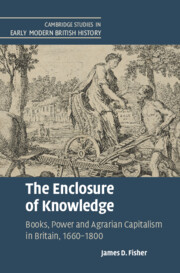
-
Select format
-
- Publisher:
- Cambridge University Press
- Publication date:
- July 2022
- July 2022
- ISBN:
- 9781009049283
- 9781316517987
- 9781009048736
- Dimensions:
- (229 x 152 mm)
- Weight & Pages:
- 0.64kg, 346 Pages
- Dimensions:
- (229 x 152 mm)
- Weight & Pages:
- 0.501kg, 346 Pages
You may already have access via personal or institutional login- Subjects:
- British History after 1450, History, Economic History
Book description
The rise of agrarian capitalism in Britain is usually told as a story about markets, land and wages. The Enclosure of Knowledge reveals that it was also about books, knowledge and expertise. It argues that during the early modern period, farming books were a key tool in the appropriation of the traditional art of husbandry possessed by farm workers of all kinds. It challenges the dominant narrative of an agricultural 'enlightenment', in which books merely spread useful knowledge, by showing how codified knowledge was used to assert greater managerial control over land and labour. The proliferation of printed books helped divide mental and manual labour to facilitate emerging social divisions between labourers, managers and landowners. The cumulative effect was the slow enclosure of customary knowledge. By synthesising diverse theoretical insights, this study opens up a new social history of agricultural knowledge and reinvigorates long-term histories of knowledge under capitalism.
Reviews
‘… it is no doubt true that this history of the enclosure of knowledge about farming 'has profound significance for our understanding of how modern capitalism developed' (275). Fisher has provided us with an important reminder of this significance and a useful discussion of a remarkably extensive set of books on agriculture and has packaged it all in interesting and articulate prose.’
Jim Handy Source: Agricultural History
‘The copious publication of agricultural literature in Britain during the late seventeenth and eighteenth centuries has received very little sustained attention since the studies of George Fussell several decades ago, a body of work now not much consulted … Hence James D. Fisher’s work on this theme … is very welcome, and he has done a very thorough survey of the available works (made possible now through electronic depositories).’
Paul Warde Source: Journal of Modern History
‘… a splendid book rethinking the intellectual and cultural history of books and pamphlets about agriculture and the countryside in the long eighteenth century. It is written with great clarity and considerable verve, sweeping the reader through a fascinating story about the transformation of agricultural knowledge over time.’
John Broad Source: Cultural and Social History
Contents
Metrics
Full text views
Full text views help Loading metrics...
Loading metrics...
* Views captured on Cambridge Core between #date#. This data will be updated every 24 hours.
Usage data cannot currently be displayed.
Accessibility standard: Unknown
Why this information is here
This section outlines the accessibility features of this content - including support for screen readers, full keyboard navigation and high-contrast display options. This may not be relevant for you.
Accessibility Information
Accessibility compliance for the PDF of this book is currently unknown and may be updated in the future.


